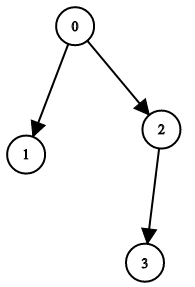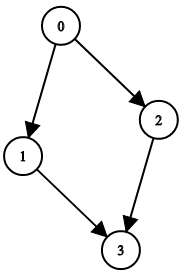LeetCode in Kotlin
1361. Validate Binary Tree Nodes
Medium
You have n binary tree nodes numbered from 0 to n - 1 where node i has two children leftChild[i] and rightChild[i], return true if and only if all the given nodes form exactly one valid binary tree.
If node i has no left child then leftChild[i] will equal -1, similarly for the right child.
Note that the nodes have no values and that we only use the node numbers in this problem.
Example 1:

Input: n = 4, leftChild = [1,-1,3,-1], rightChild = [2,-1,-1,-1]
Output: true
Example 2:

Input: n = 4, leftChild = [1,-1,3,-1], rightChild = [2,3,-1,-1]
Output: false
Example 3:

Input: n = 2, leftChild = [1,0], rightChild = [-1,-1]
Output: false
Constraints:
n == leftChild.length == rightChild.length1 <= n <= 104-1 <= leftChild[i], rightChild[i] <= n - 1
Solution
import java.util.ArrayDeque
import java.util.Deque
class Solution {
fun validateBinaryTreeNodes(n: Int, leftChild: IntArray, rightChild: IntArray): Boolean {
val inDeg = IntArray(n)
for (i in 0 until n) {
if (leftChild[i] >= 0) {
inDeg[leftChild[i]] += 1
}
if (rightChild[i] >= 0) {
inDeg[rightChild[i]] += 1
}
}
val queue: Deque<Int> = ArrayDeque()
for (i in 0 until n) {
if (inDeg[i] == 0) {
if (queue.isEmpty()) {
queue.offer(i)
} else {
// Violate rule 1.
return false
}
}
if (inDeg[i] > 1) {
// Violate rule 2.
return false
}
}
var tpLen = 0
while (queue.isNotEmpty()) {
val curNode = queue.poll()
tpLen++
val left = leftChild[curNode]
val right = rightChild[curNode]
if (left > -1 && --inDeg[left] == 0) {
queue.offer(left)
}
if (right > -1 && --inDeg[right] == 0) {
queue.offer(right)
}
}
return tpLen == n
}
}

